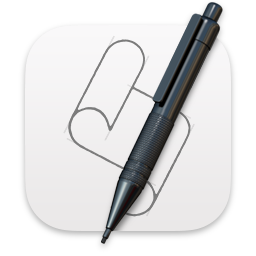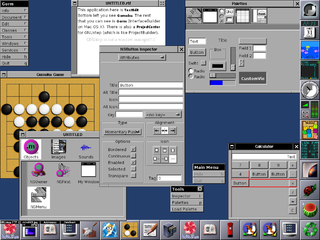This page is based on this
Wikipedia article Text is available under the
CC BY-SA 4.0 license; additional terms may apply.
Images, videos and audio are available under their respective licenses.

HyperCard was a piece of application software and a programming tool for Apple Macintosh and Apple IIGS computers. It was among the first successful hypermedia systems before the World Wide Web.

NeXTSTEP is a discontinued object-oriented, multitasking operating system based on UNIX. It was developed by NeXT Computer in the late 1980s and early 1990s and was initially used for its range of proprietary workstation computers such as the NeXTcube. It was later ported to several other computer architectures.
OpenStep is a defunct object-oriented application programming interface (API) specification for a legacy object-oriented operating system, with the basic goal of offering a NeXTSTEP-like environment on non-NeXTSTEP operating systems. OpenStep was principally developed by NeXT with Sun Microsystems, to allow advanced application development on Sun's operating systems, specifically Solaris. NeXT produced a version of OpenStep for its own Mach-based Unix, stylized as OPENSTEP, as well as a version for Windows NT. The software libraries that shipped with OPENSTEP are a superset of the original OpenStep specification, including many features from the original NeXTSTEP.
In computing, cross-platform software is computer software that is implemented on multiple computing platforms. Cross-platform software may be divided into two types; one requires individual building or compilation for each platform that it supports, and the other one can be directly run on any platform without special preparation, e.g., software written in an interpreted language or pre-compiled portable bytecode for which the interpreters or run-time packages are common or standard components of all platforms.

AppleScript is a scripting language created by Apple Inc. that facilitates automated control over scriptable Mac applications. First introduced in System 7, it is currently included in all versions of macOS as part of a package of system automation tools. The term "AppleScript" may refer to the language itself, to an individual script written in the language, or, informally, to the macOS Open Scripting Architecture that underlies the language.
SuperCollider is an environment and programming language originally released in 1996 by James McCartney for real-time audio synthesis and algorithmic composition.
F-Script is an object-oriented scripting programming language for Apple's macOS operating system developed by Philippe Mougin. F-Script is an interactive language based on Smalltalk, using macOS's native Cocoa API.

The Application Kit, usually called AppKit, is a graphical user interface toolkit for macOS. It comprises a collection of Objective-C classes and protocols that can be used to build an application for the Mac. These classes can also be used in Swift through its Objective-C bridge. Xcode has built-in functionality for developing a Cocoa application using AppKit, including the ability to visually design user interfaces with Interface Builder.

A class browser is a feature of an integrated development environment (IDE) that allows the programmer to browse, navigate, or visualize the structure of object-oriented programming code.
In the macOS, iOS, NeXTSTEP, and GNUstep programming frameworks, property list files are files that store serialized objects. Property list files use the filename extension .plist, and thus are often referred to as p-list files.
In NeXTSTEP, OPENSTEP, GNUstep, and their lineal descendants macOS and iOS, a bundle is a file directory with a defined structure and file extension, allowing related files to be grouped together as a conceptually single item.
GNUstep Renaissance is a development framework that reads XML descriptions of graphical user interfaces from an application bundle and converts them into native widgets and connections at runtime under either GNUstep or Mac OS X.
Cappuccino is an open source application development framework for developing web applications that look and feel like desktop applications on Mac OS X. Cappuccino was developed by University of Southern California graduates Francisco Tolmasky, Tom Robinson and Ross Boucher, who are also the founders of 280 North, Inc. It is primarily targeted towards web applications developers.
Objective-C is a general-purpose, object-oriented programming language that adds Smalltalk-style messaging to the C programming language. It was the main programming language supported by Apple for the macOS and iOS operating systems, and their respective application programming interfaces (APIs) Cocoa and Cocoa Touch until the introduction of Swift.
The programming language Objective-C was originally developed in the early 1980s. It was selected as the main language used by NeXT for its NeXTSTEP operating system, from which macOS and iOS are derived. Portable Objective-C programs that do not use the Cocoa or Cocoa Touch libraries, or those using parts that may be ported or reimplemented for other systems, can also be compiled for any system supported by GNU Compiler Collection (GCC) or Clang.
Swift is a general-purpose, multi-paradigm, compiled programming language developed by Apple Inc. for iOS, macOS, watchOS, tvOS, Linux and z/OS. Swift is designed to work with Apple's Cocoa and Cocoa Touch frameworks and the large body of existing Objective-C code written for Apple products. It is built with the open source LLVM compiler framework and has been included in Xcode since version 6, released in 2014. On Apple platforms, it uses the Objective-C runtime library which allows C, Objective-C, C++ and Swift code to run within one program.






